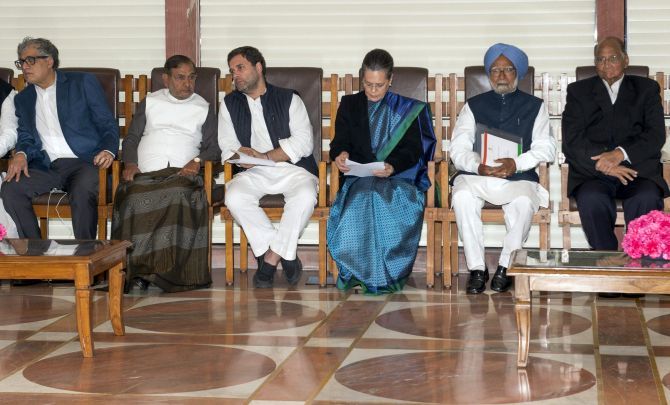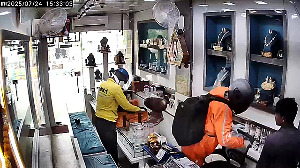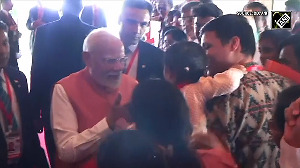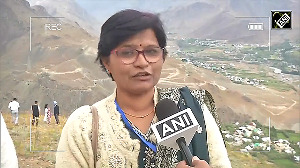The road for the Opposition is full of ‘ifs’ and ‘buts’, reports Sunil Gatade.

On the opening day of the budget session on January 29, Prime Minister Narendra Modi walked up to an opposition leader and, after exchanging pleasantries, asked jovially why his friends had suddenly become super-active.
This was on a day when Nationalist Congress Party supremo Sharad Pawar had called a meeting of opposition leaders at his 6, Janpath residence in New Delhi to chalk out the strategy for the crucial session.
Pawar of late has become politically active.
On Republic Day, he was in the forefront of the “Save the Constitution” march by opposition figures in Mumbai in the wake of Union Minister Anant Kumar Hegde’s remark about changing the Constitution.
Right or wrong, but for the Dalits, especially in Maharashtra, any attempt to change the Constitution is considered an insult to B R Ambedkar.
As news of the meeting convened by Pawar came, Congress managers, in a bid to assert that the initiative had not slipped out of the party’s hands, reiterated Sonia Gandhi will continue as chairperson of the United Progressive Alliance and she will call a meeting of opposition leaders soon.
The meeting convened by Pawar did not come a day too soon.
There has been a concern in the opposition camp over Congress President Rahul Gandhi becoming inactive after the Gujarat assembly elections.
Many had begun asking not so privately whether the Congress is readying itself for a 2024 battle, instead of the one next year.
A section of the Opposition feels that Rahul is not a serious politician.
Pulls and pressures are evident.
NCP leader Praful Patel insisted the Pawar-sponsored meet was just to firm up the Opposition’s plans for the budget session, indicating that such gatherings are bound to grow as elections approach.
Significantly, the Trinamool Congress was not represented in the meeting.
The Communist Party of India-Marxist and the CPI, the TMC’s major opposition in West Bengal, where it is ruling, were present.
Trinamool Congress chief and West Bengal Chief Minister Mamata Banerjee has made her national ambitions known time and again, with her partymen ruling out their leader playing second fiddle to anyone.
There is no change in that position, despite Rahul being projected as the natural leader to helm the Opposition’s charge in the next Lok Sabha polls for the way he led the party’s campaign during the Gujarat poll battle -- he is being seen as the “man of the match”, though Modi’s Bharatiya Janata Party scraped to victory.
Naveen Patnaik’s Biju Janata Dal, in power in Odisha for nearly two decades, has been keeping equidistance from both the Congress and the BJP, and there appears no change in that position, despite the saffron party making serious inroads into the state.
The road for the Opposition is thus full of ‘ifs’ and ‘buts’.
The CPI-M Central Committee had last month vetoed the proposal for an understanding with the Congress.
Recently, the Samajwadi Party’s Akhilesh Yadav too declared that he had no plan, so far, to align with any party for the Lok Sabha polls.
Bahujan Samaj Party chief Mayawati has never believed in pre-poll tie-ups.
In 2009, she did not want to cede even a little ground to allies on her home turf of Uttar Pradesh, even when the Left was ready to back her as the PM candidate of the Third Front.
But, it is equally evident that the BJP’s resurgence in Uttar Pradesh is cause for concern in a section of the Opposition.
Former Union minister P Chidambaram’s remarks that “some kind of broad understanding” will be worked out among the opposition parties give the game away.
It means that a United Progressive Alliance-III on the Congress’s terms is far from a reality and anyone who is someone in the political game will have to be accommodated and adjusted, directly or indirectly, in the anti-Modi campaign.
A section in the Congress too is against a pre-poll alliance in all states, arguing it could be detrimental to the growth of the party.
This section feels that the Congress should go for state-specific alliances.
For decades, the Congress has played second fiddle to either of the two major Dravidian parties in Tamil Nadu and Lalu Prasad’s Rashtriya Janata Dal in Bihar.
Also, three opposition groups’ formation is being discussed: The UPA consisting of the Congress, the NCP, the RJD and the Dravida Munnetra Kazhagam with likely outside support from the Left; a second group of the TMC, the BJD and the Telugu Desam, currently part of the ruling National Democratic Alliance; and a third of ‘fence-sitters’ like the Telangana Rashtra Samithi and the Janata Dal-Secular.
A number of state polls this year will show which way the wind is blowing.
Image: UPA chairperson Sonia Gandhi, former prime minister Dr Manmohan Singh, NCP president Sarad Pawar, Congress president Rahul Gandhi, TMC leader Derek O'Brien and rebel JD-U Leader Sharad Yadav at an opposition parties meeting in New Delhi. Photograph: Atul Yadav/PTI Photo











